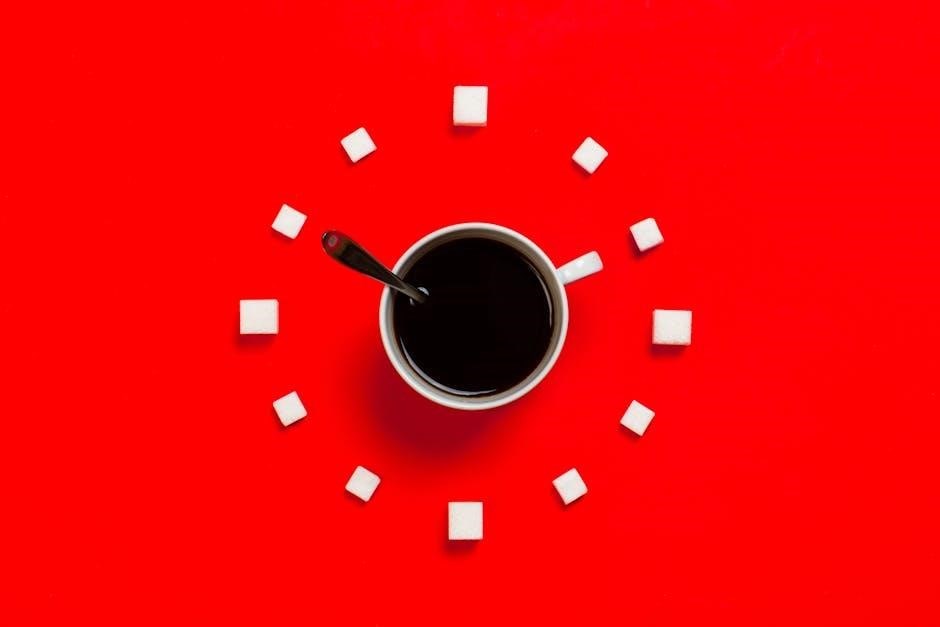
spoon theory pdf
Discover how to manage your energy effectively with the Spoon Theory. Download the free PDF guide for practical tips and insights.
The Spoon Theory, created by Christine Miserandino, explains life with chronic illness through a metaphor of limited spoons representing energy․ It helps others understand daily challenges․
1․1 What is the Spoon Theory?
The Spoon Theory, created by Christine Miserandino, is a metaphor that explains the life of those with chronic illnesses․ It compares energy levels to a limited number of spoons, where daily tasks “cost” spoons․ Running out of spoons means reaching energy limits, making it a relatable way to describe the challenges of living with conditions like lupus or other disabilities․
1․2 Purpose of the Spoon Theory
The Spoon Theory aims to help others understand the daily struggles of living with chronic illnesses․ By using spoons as a visual metaphor for energy, it simplifies the concept of limited stamina, enabling non-sufferers to grasp the challenges faced by those with conditions like lupus or other disabilities, fostering empathy and better communication․

Origin of the Spoon Theory
The Spoon Theory originated in 2003 when Christine Miserandino used spoons as a metaphor to explain her lupus struggles to a friend in a diner․
2․1 Christine Miserandino and Her Story
Christine Miserandino, a lupus patient, created the Spoon Theory to explain her daily struggles․ She used spoons as a metaphor for energy, illustrating how chronic illness limits activities․ Her personal story highlights the challenges of living with an autoimmune disease, resonating with many facing similar difficulties․ This led to the theory’s widespread acceptance and use in disability advocacy․
2․2 How the Theory Was Conceived
The Spoon Theory was conceived during a conversation between Christine Miserandino and her friend in a diner․ She used spoons from the table to visually explain how her energy was limited by lupus․ This intuitive metaphor became a powerful tool to describe the daily challenges of chronic illness, simplifying a complex experience into an easily relatable concept․

Key Concepts of the Spoon Theory
The Spoon Theory uses spoons as a metaphor for energy, emphasizing limited resources and daily allocation challenges for those with chronic illnesses, created by Christine Miserandino․
3․1 Spoons as a Metaphor for Energy
In the Spoon Theory, spoons symbolize units of energy․ Each daily task consumes a certain number of spoons, illustrating how chronic illness limits energy reserves․ This metaphor helps explain the constant need to prioritize activities due to finite resources, making it relatable and easy to understand for those without chronic conditions․
3;2 Allocation of Spoons in Daily Life
The Spoon Theory emphasizes that individuals with chronic illnesses must carefully allocate their limited “spoons” across daily tasks․ Simple activities, like eating or showering, consume spoons, forcing prioritization․ The allocation varies based on severity, with severe days leaving fewer spoons․ This system highlights the constant need to balance and plan, illustrating the invisible challenges of living with limited energy․
3․3 Limitations of the Spoon Theory
While the Spoon Theory is a powerful metaphor, it has limitations․ It oversimplifies complex conditions by reducing energy to a single metric, spoons․ It doesn’t account for varying energy levels or unpredictable symptoms․ Additionally, it may not fully capture emotional or psychological challenges, offering a limited perspective on the multifaceted nature of chronic illnesses․ Its simplicity can sometimes overshadow individual differences in experiences․

The Spoon Theory in Practice
The Spoon Theory provides a practical guide to understanding energy management in chronic illness, helping individuals prioritize tasks and make informed decisions daily․
4․1 How Spoons Represent Energy Levels
In the Spoon Theory, spoons symbolize units of energy․ Each task consumes a certain number of spoons, reflecting the limited capacity of individuals with chronic illnesses․ This visual metaphor helps illustrate how daily activities, no matter how small, can deplete energy reserves, making it essential to prioritize and allocate spoons wisely to manage health effectively․
4․2 Practical Examples of Spoon Allocation
Practical examples of spoon allocation include assigning a set number of spoons to daily tasks․ For instance, getting dressed might cost two spoons, while a shower costs three․ Social activities, like dining out, might use five spoons․ This system helps individuals with chronic illnesses budget their energy, ensuring they prioritize tasks without overextending themselves and risking exhaustion or health setbacks․

The Spoon Theory and Chronic Illness
The Spoon Theory, developed by Christine Miserandino, effectively explains the daily struggles of living with chronic illnesses like Lupus by using spoons as an energy metaphor․
5․1 The Spoon Theory and Lupus
Christine Miserandino developed the Spoon Theory to explain her life with Lupus, a chronic autoimmune disease․ The metaphor of spoons as limited energy units illustrates the daily challenges of managing symptoms, flare-ups, and invisible struggles․ It helps others understand the unpredictability and fatigue associated with Lupus, making the invisible illness more relatable and tangible for those without firsthand experience․
5․2 Application to Other Chronic Conditions
The Spoon Theory extends beyond Lupus, applying to various chronic illnesses like fibromyalgia, ME/CFS, and arthritis․ It universalizes the experience of limited energy, helping others grasp the challenges of pacing, task prioritization, and unseen struggles․ While rooted in Lupus, its broader relevance has made it a powerful tool for many chronic illness communities, fostering empathy and understanding․

The Spoon Theory PDF
The Spoon Theory PDF, written by Christine Miserandino, is a concise guide explaining her energy metaphor for chronic illness․ It’s widely available for free download online․
6․1 Where to Download the Spoon Theory PDF
The Spoon Theory PDF, authored by Christine Miserandino, is freely available online․ It can be downloaded from her official website, butyoudontlooksick․com, or platforms like Scribd․ This resource provides a clear explanation of her energy metaphor, making it accessible for those seeking to understand chronic illness experiences․ It’s a valuable tool for personal insight or sharing with others to foster empathy and awareness․
6․2 Key Takeaways from the PDF
The Spoon Theory PDF introduces the metaphor of “spoons” as units of energy, explaining how chronic illness limits daily activities․ It shares Christine Miserandino’s personal journey with lupus, highlighting how tasks others take for granted require careful planning․ The PDF emphasizes the emotional and physical challenges of living with limited energy, offering insights into the resilience required for daily life with chronic conditions․

The Impact of the Spoon Theory
The Spoon Theory has profoundly impacted chronic illness understanding, helping others grasp energy limits and daily challenges, fostering empathy and advocacy for those living with disabilities․
7․1 How the Spoon Theory Helps in Understanding Chronic Illness
The Spoon Theory provides a relatable metaphor for chronic illness, illustrating how limited energy affects daily tasks․ It simplifies complex struggles, helping others empathize with the challenges of living with conditions like lupus․ By translating invisible limitations into tangible “spoons,” it bridges communication gaps between patients and their communities, fostering understanding and support․
7․2 The Spoon Theory’s Role in Disability Advocacy
The Spoon Theory has become a powerful tool in disability advocacy, helping to explain the challenges of chronic illness․ It raises awareness about energy limitations and daily struggles, fostering empathy and understanding․ By simplifying complex experiences, it advocates for accommodations and policy changes, sparking conversations about accessibility and inclusion․ Its impact extends to creating a more supportive environment for those with disabilities․

The Spoon Theory in Modern Discussions
The Spoon Theory is widely discussed in social media, online communities, and academic contexts, serving as a framework to explain chronic illness experiences and advocate for understanding․
8․1 The Spoon Theory in Social Media and Online Communities
The Spoon Theory has become a popular topic in social media and online forums, where individuals share personal stories and infographics to explain chronic illness experiences․ It fosters a sense of community among “spoonies,” providing a relatable framework for discussing energy limits and daily challenges․ Online discussions often emphasize the theory’s role in raising awareness and advocating for understanding of invisible disabilities․
8․2 The Spoon Theory in Academic and Research Contexts
The Spoon Theory has gained traction in academic circles, with researchers exploring its relevance to disability studies and chronic illness management․ It provides a framework for understanding energy limitations and has been referenced in studies on invisible disabilities․ The theory’s simplicity makes it a valuable tool for both researchers and educators seeking to explain complex health challenges in an accessible way․

The Spoon Theory and Personal Stories
Christine Miserandino’s personal story and the Spoon Theory have inspired countless individuals to share their own journeys with chronic illness, fostering connection and understanding․
9․1 Christine Miserandino’s Personal Journey
Christine Miserandino, living with lupus, devised the Spoon Theory to explain her daily struggles․ Her personal story highlights how limited energy affects every aspect of life, inspiring others to share their own experiences and fostering empathy among those unfamiliar with chronic illness challenges․
9․2 Stories from Other “Spoonies”
Beyond Christine, many “Spoonies” share their journeys, illustrating diverse experiences with chronic illnesses․ These stories, often emotional and relatable, highlight resilience and adaptation, proving the universal relevance of the Spoon Theory in capturing life with limited energy and daily challenges․

The Spoon Theory’s Relevance Today
The Spoon Theory remains a vital tool for understanding chronic illness, offering a universal metaphor that resonates across diverse conditions, fostering empathy and awareness globally․
10․1 The Continued Importance of the Spoon Theory
The Spoon Theory remains essential today, providing a relatable framework for explaining chronic illness․ Its simplicity helps bridge communication gaps between patients and others, fostering understanding and empathy․ Widely shared, it continues to empower individuals to advocate for themselves and educate others about life with limited energy․ Its impact endures, making it a timeless resource․
10․2 Its Influence on Modern Disability Discourse
The Spoon Theory has significantly shaped modern disability discourse by providing a relatable metaphor for energy limitations․ It has inspired widespread awareness, fostering deeper understanding of chronic illness․ The theory has become a cornerstone in advocacy, encouraging open conversations about accessibility and accommodations; Its simplicity has made it a powerful tool for educating society and promoting inclusivity․
The Spoon Theory is a powerful metaphor for understanding chronic illness․ Share it to spread awareness and foster empathy for those living with limited energy and resilience․
11․1 Final Thoughts on the Spoon Theory
The Spoon Theory remains a vital tool for expressing the invisible struggles of chronic illness․ By simplifying complex experiences into relatable terms, it fosters understanding and empathy․ Its enduring relevance lies in its ability to connect people across different conditions, creating a shared language for resilience and daily challenges faced by spoonies worldwide․
11․2 Encouragement to Share the Spoon Theory
Sharing the Spoon Theory is crucial for raising awareness about chronic illnesses․ By explaining it to others, you help bridge the gap between the visible and invisible challenges faced by spoonies․ Encourage friends, family, and online communities to read the Spoon Theory PDF and share it widely․ Together, we can foster understanding, empathy, and support for those living with chronic conditions․